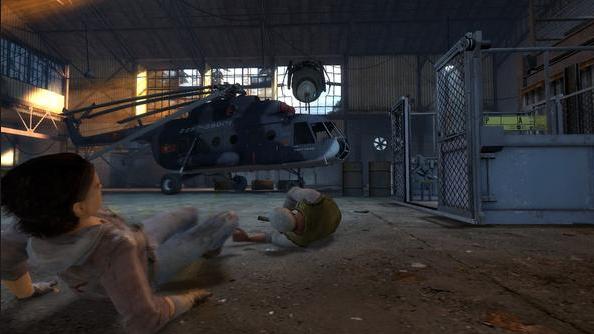Editor's note: This one's from the vault; a post we should've caught when it went up a week ago. Omar makes the argument that silent protagonists make for a more immersive (always a dangerous word) experience. The writer in me doesn't want to believe it — but when the hero is chatty, I do feel like I'm 'playing' another person. That's not necessarily a bad thing, though. Just different, like reading a book in third person as opposed to first.
Warning: Half-Life 2 spoilers, in case you haven't gotten around to that yet. Don't roll your cursor over the image below, and don't read too far, either. -Demian
What makes a good story? What is it exactly that makes your eyes-widen, your brow perspire and your body shuffle to the edge of the seat in anticipation? Rarely does one single element make a story "good"; it's usually a matter of taste. But in my experience, immersion is the paramount factor in making a story memorable.

Would this scene have been as emotionally effective if you saw it in
a cinematic, instead of through "your" own eyes? (Rollover: Ouch!)
I would argue that an anecdote or scene becomes far more powerful if the spectators are actually involved in the event, and have an element of perceived or real emotional investment. So how do mute or otherwise silent protagonists promote immersion? How is immersion achieved? Does immersion make a story more entertaining? Let's find out. The first hint takes the form of an unlikely ellipses.
"…"
It's a relatively common response by protagonists in videogames to questions or comments directed at them, and one that's inscrutable by design. For years, game developers have created, with varying success, characters who are essentially mute. The purpose of this narrative choice is to create a "second person" perspective, wherein the player takes the role of the character. The choice a developer makes when deciding whether the protagonist remains silent or has scripted lines is immensely important and can create wildly different experiences.
In Jak and Daxter: The Precursor Legacy, Jak began as a silent yet wide-eyed adventurer. While his lines were virtually non-existent, this absence of speech allowed the player to comfortably slide into the shoes of the protagonist, taking on the adventure in his or her own style. A new and redesigned Jak appeared in Jak 2, voiced by a gruff, misanthropic actor whose cynical lines did little towards achieving immersion. Suddenly, the player was ousted from the stage and relegated to the audience, watching as Jak's lines were delivered with professional bravado. Jak 2 was not necessarily a bad game because of this stylistic departure, but the game seems to have proven that if you decide to create a well-developed and fleshed out protagonist instead of a mute, unscripted one, you might as well say goodbye to any potential immersion.
When the protagonist delivers lines of dialogue, it becomes increasingly difficult to perpetuate the illusion that the player is the main character. Would I still have cried (and yes, I cried!) when Eli Vance died in Half-Life 2 if Gordon had lines to deliver? If Jack, in BioShock, wasn't mute, would the decision of harvesting little sisters have been so difficult? Would saving Hyrule be such an admirable accomplishment if Link ever spoke? No, not to me, at least.
Why? Because in the context of Zelda, I became Link. If Link was a loud-mouthed brat, I would instantly recognize that we were different, and as a result, our interests would be different. I wouldn't care about Ganon, Hyrule, or even the pretty, pixelated Zelda as much.
Of course, there are a few pesky exceptions. Naughty Dog, the same developers who brought us Jak and Daxter, also created Nathan Drake in Uncharted — a character so universally likeable that he potentially puts to rest questions of scripting and immersion. But not all developers have the same talents. It's still much easier to simply create a vessel which the player can occupy.

Nathan Drake may be among the few exceptions to the rule. He has a well-
developed personality without sacrificing a sense of emotional investment and
immersion. The player cares for him and his companions, without becoming him.
I don't mean to imply that Metroid's Samus is one-dimensional or that the script writers at Valve are incompetent. But immersion is simply a more realistic objective when the developer doesn't have to worry if the protagonist shares the same personality traits as the player controlling him. While other in-game characters may address you by a different name from your own, it's much easier to "become" Master Chief when there isn't a 50-page script in between you and the events of Halo: Combat Evolved.
Until developers begin to invest more of their time in creating believable and amiable characters, I'll rely on my mute friends to provide me with in-game immersion. Because until that day, choosing between well-scripted games and those with silent protagonists will be comparable to choosing between being an actor or a member of an audience. The choice may be hard for some, but I was never made to sit in a chair and watch. Well, maybe literally I'll sit in a chair and watch, but you know what I mean.



